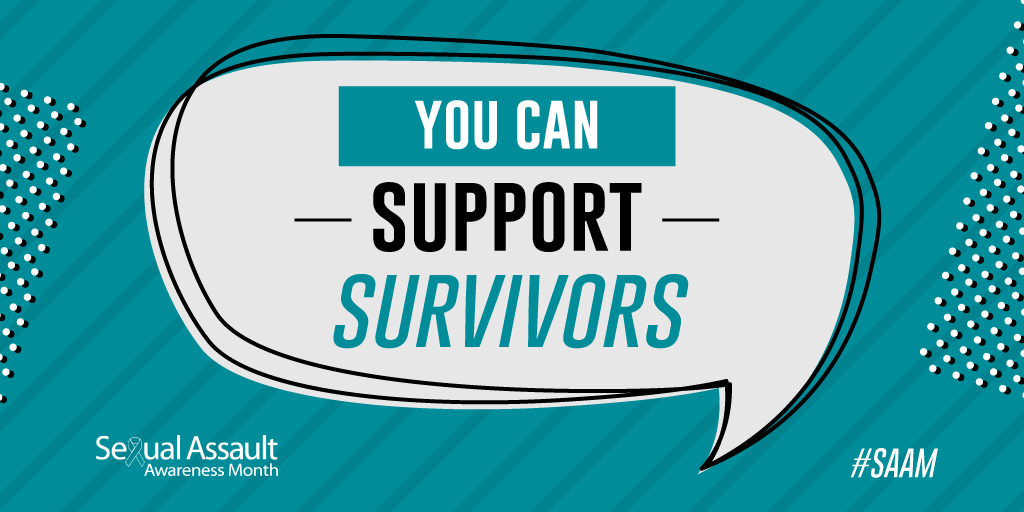Abortion rights, women of color, and LGBTQIA+ people are under attack. Pledge to join us in fighting for gender justice.
Sexual Assault Awareness Month: How to Support Survivors

April is Sexual Assault Awareness Month, and in honor of it, this blog has been created to draw awareness to sexual violence, intimate partner violence, and violence that occurs between teenage partners.

So you’re probably wondering, “What exactly is sexual violence and intimate partner violence?” Well, do I have an answer for you.
Sexual violence is refers to physical sexual acts perpetrated against a person’s will or where a person is incapable of giving consent. 36.3 percent of women and 17.1 percent of men will experience sexual violence at some point in their lives.
Intimate partner violence is any emotional, physical, sexual, and/or psychological violence that occurs within a dating or intimate relationship. The violence can occur online or in person between a current or former partner. Teen intimate partner violence can have both critical short-term and long-term effects on a person’s life. As a person who will soon leave adolescence behind, I have seen the realities of teen dating violence in my life and the lives of my loved ones. The numbers show just how pervasive teen dating violence is – one in three teen girls is a victim of physical, emotional, or verbal abuse from a dating partner.
Sexual violence and intimate partner violence are serious problems that affect girls and young women. Women aged 16 to 24 experience intimate partner violence at the highest rate of any age group, almost three times the national average. Approximately one in five high school girls has been physically or emotionally abused by a dating partner. On college campuses, one in five women and one in 16 men are sexually assaulted during their time in school. Out of all college women who are assaulted, only about 10 percent report the violence. And of all teenagers who have experienced intimate partner violence, a whopping 67 percent will never tell anyone about it.

These numbers are terrifying not only because of how large they are, but also because of how real they are. Teen dating violence consumes teen dating culture and is often only talked about after someone has experienced trauma, which can leave the long-lasting harmful effects. Teen dating violence can lead to anxiety or depression, substance abuse, eating disorders, and unsafe sexual behaviors. Teen girls who have been physically or sexually abused are six times more likely to have an unintended pregnancy and twice as likely to get a Sexually Transmitted Infection (STI).
How you can support survivors:
- Believe them: One of the top reasons survivors don’t share their experiences with trauma is because they fear people will not believe their stories.
- Don’t blame them: Someone’s clothes, relationship status, or demeanor should never justify sexual violence.
- Respect their process for healing and justice: The criminal justice system is not the route all survivors take, so honor all avenues and journeys to healing.

Resources for Survivors
Teens and adults who find themselves in a violent relationship, pregnant, or with an STI are not without help.
- Legal Network for Gender Equity: If you are experiencing sexual violence or intimate partner violence in an education, workplace, or healthcare context, you can get find legal assistance at NWLC’s Legal Network for Gender Equity.
- CoverHer Hotline: The Affordable Care Act requires insurance plans to cover – at no cost to you – certain women’s preventive services, including screening for interpersonal and domestic violence. That means your health care provider should – at least annually – ask you about whether you are experiencing violence and be able to assist you if you are. Your health care provider is a safe place to talk about what you’re going through. And if you need access to other preventive services – like birth control, testing and counseling for sexually transmitted infections, or breastfeeding support and supplies – those are also required to be covered by your insurance without cost to you. If you want more information about which services for women must be covered, visit the Care Women Deserve Campaign, which was created to educate people about the women’s preventive services available to them at no cost thanks to the ACA. Preventive services are a key part of the health care services that help patients maintain their mental, physical and emotional health, and prevent the development of serious health issues – getting screened for interpersonal and domestic violence screening is a critical step to exiting harmful relationships. And if for any reason your health insurance company tells you that you aren’t eligible for these no-cost women’s preventive services, contact NWLC’s CoverHer hotline.
- National Domestic Violence Hotline: If you or anyone you know is ever in a violent intimate partner relationship, you are not alone and there are resources available to support you. Please reach out to the National Domestic Violence Hotline if you want to talk one on one 24/7. (Learn more from the Pharmacy Times.)





